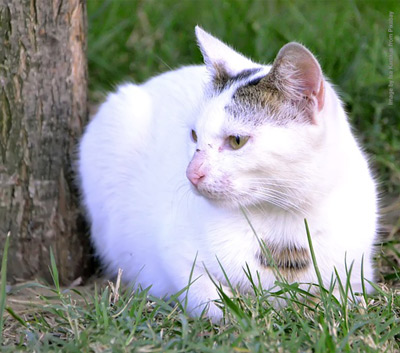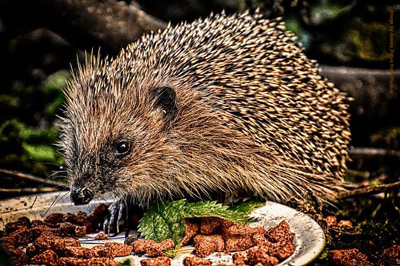Hot weather poses many risks for animals: dehydration, sunburn, flea infestation, allergies, and perhaps the most serious; heat-stroke. So prepare to beat the heat, and keep animals healthy and happy in summer!
Cool for Cats
 Provide your cat with plenty of water, in various positions around the house, or in shadier positions in the garden.
Provide your cat with plenty of water, in various positions around the house, or in shadier positions in the garden.
Make sure they can get to a cool, shady place to escape from the heat at all times of day. Encourage them into the shade during the hottest part of the day. If they refuse, it may be safer to keep them inside for a few hours from around 11am until the temperature has cooled down later in the afternoon.
Cats can get sunburnt too - particularly those with light coloured or fine hair, and should have these areas, particularly noses and ears protected with pet-safe sunblock. They are inclined however to lick this off, which means you may need to re-apply several times a day. Your vet can give advice on suitable sun creams that are safe to use on pets.
Keeping your cat well-groomed will remove excess hair and therefore help to avoid overheating, and give you the opportunity to check for fleas, ticks or skin allergies. Warm weather increases the number of fleas and causes great discomfort. It is essential that all your pets, and pet beds are flea-treated at the same time. If you find a tick on your cat, follow this guide about how to remove them: Correct Tick Removal is vital in helping prevent disease transmission.
If you live on a main road, or in an upper-floor flat, be aware of open windows - a cool breeze flowing in may be just too tempting for cats. Careful supervision, or a suitable window screen is advisable to prevent cats from falling from a height, escaping into traffic etc.
Wet food and litter trays are a magnet for flies in summer, so make sure to change litter regularly, and don't leave wet food out for longer than necessary.
Hot Dogs
Ensure your dog always has access to plenty of fresh drinking water. Spill-proof bowls are ideal.
Avoid overheating by walking and exercising dogs early in the morning, or in the evening when it is cooler outside. On extremely hot days, avoid walking your dog on surfaces which absorb heat, such as concrete, asphalt, or even sandy beaches, as dogs can suffer burns to the pads of their feet. Similarly, don't leaving your dog standing on a hot pavement, outside a shop for example, always find somewhere shady for him to sit. Check out this excellent PDSA blog post: 8 steps to safely exercising your dog in hot weather
Cars heat up rapidly in high temperatures, even with a window open. The consequences of leaving animals in this environment - even for short periods, can be devastating - even fatal. The transportation of animals in hot weather should be avoided. If it is absolutely necessary, early morning and night time are the best times for pet transportation. Please never, ever leave an animal unattended in a vehicle in hot weather.
A do-it-yourself outdoor sun shelter is a great idea for dogs (and cats!). Simply place a table or a chair with a sheet over the top, somewhere out of direct sun. Create a front and back opening for access, and ventilation. Use cooling mats or damp towels to keep the temperature down inside, and introduce your pet to the shelter with their favourite treats, toys etc. The shelter may need moving later in the day as the sun moves round.
Not all dogs are good swimmers, but the temptation of a cool glistening pool may be too great for some. Careful judgement and supervision is required in these circumstances to avoid the risk of drowning. Finally, when the sun comes out, quite often, so does the BBQ! Cooked bones can be a real problem to dogs, becoming lodged or splintering in their throats. Explain this to your guests beforehand, and clear waste food away promptly. If you have a dog that has his coat trimmed, now might be a good time to do it! Not too much though, as the hair also insulates against heat, and provides sun protection. Always seek advice if you are not sure.
No Sweat for Rabbits
Rabbits do not sweat, and in the wild choose to live underground which means they are not out in the heat of the day. It is therefore, important to give them a little help to keep cool during the summer to avoid them getting stressed, uncomfortable and to avoid the risk of heat-stroke.
Move hutches into a shady spot, and ensure their run has plenty of shade too. Make sure water feeding bottles are kept topped up regularly with cool, fresh water. Keep rabbits, and their housings clean - rabbit droppings and dampness will attract flies in the hot weather. Freeze house-bricks or half filled plastic bottles of water and place them in the hutch or run, so your rabbit can cool off by it if needed.
Fins and Feathers
Fish tanks and bowls should also be kept out of direct sunlight. Change their water and keep it clear of algae, which spreads much faster on sunny days. Caged birds and animals should always be housed out of direct sunlight and have their water bottles checked regularly.
Happy Horses
Water should always be your first priority in keeping horses safe and well in the heat. It should be available at all times and it should be clean and as fresh as possible. Keep water troughs and stock tanks clean and free from insects. Feed quality hay, especially as warm weather slows grass growth, and pasture quality declines.
Make sure there is a place for your horse to avoid the sun, either a building or a shady tree. During very hot weather, consider keeping your horses stabled during the day and ensure that the barns they live in are well ventilated. Suitable insect sprays, fly masks, and barn and stable traps may be needed to protect your horse from flies, and biting insects.
Replacing mineral salts lost through sweating may be needed, but planning exercise sessions in a way which minimises excessive sweating is even better!
Clip horses with heavy coats. Be careful not to clip too close however, since exposed skin can burn. Apply a zinc oxide sunscreen or a visor if needed, to pink or hairless skin over the nose.
Heatstroke in pets can be debilitating, and even fatal. Signs of heat stroke are excessive panting, heavy salivation, rapid pulse, a red mouth, tiredness, lack of co-ordination, vomiting, diarrhoea, weakness, loss of consciousness. If you suspect that your pet has heat-stroke, move it to a cool, shady area and contact your vet immediately.
Prickly Heat
 As the ground hardens this time of year, hedgehogs will find it increasingly difficult to dig for food. Provide them with some welcome refreshment, by leaving a shallow dish of water in a shaded area, and some dog or cat food / cat biscuits (not fish flavour), or dried meal-worms out at dusk and overnight. Specialist hedgehog food can also be bought fairly cheaply online. Healthy hedgehogs will only come out to feed after dark, so if you see one out in the daytime, chances are it needs help, either just extra food, or even veterinary help. You can get advice here: www.britishhedgehogs.org.uk
As the ground hardens this time of year, hedgehogs will find it increasingly difficult to dig for food. Provide them with some welcome refreshment, by leaving a shallow dish of water in a shaded area, and some dog or cat food / cat biscuits (not fish flavour), or dried meal-worms out at dusk and overnight. Specialist hedgehog food can also be bought fairly cheaply online. Healthy hedgehogs will only come out to feed after dark, so if you see one out in the daytime, chances are it needs help, either just extra food, or even veterinary help. You can get advice here: www.britishhedgehogs.org.uk
To avoid the food being eaten by other animals, you can make a feeding station that is difficult for anything larger than a hedgehog to access: a plastic storage box, placed upside down with entrance / exit holes cut out of each end is ideal. If you have a pond and are encouraging hedgehogs into your garden, put rocks or bricks around the pond to discourage them from entering the water, and ensure there is either a 'shallow end' or some means of escape if they do fall in. Hedgehogs can swim, but not for long!
The Birds & Bees
Water: Please ensure that you provide fresh water at least once a day for your garden birds. you will amazed at how much water simply evaporates! Bird baths quickly become soiled, especially in warm weather so keeping them fresh and clean is vital. Also, if your bird-bath is deep, please put few pebbles or stones in the middle, this is for fledgling birds to clamber on if they find the water too deep, and can't yet fly well. A non-metal, shallow container placed in the shade makes a good alternative if you don't have a bird bath. If placing water dishes on the ground, make sure they are not too close to bushes or borders, as that could enable cats to lie in wait.
Food: Do feed garden birds in the summer as well as winter. They may have more natural food available, but will know where to come back to when food gets short.
Plants: Grow native plants and shrubs in your garden for birds and small mammals to enjoy. These will not only provide shade but create foraging areas by attracting insects. (Steer clear of Lilies and certain other members of the Liliaceae family, as they are extremely poisonous for cats!)
Bees: You can help bees by growing bee-friendly plants, such as lavender, marigolds or honeysuckle, or wild-flowers such as borage, clover and dandelions. Don't use pesticides to treat your garden, as the chemicals can leech into the pollen. Some pesticides (neo-nicotinoids) are a major factor in causing 'Colony Collapse' which has already greatly reduced bee numbers.
Perfect Ponds
The water level in your pond will soon drop in hot weather. To protect the wildlife, keep the level topped up, if possible with garden rain water from butts (tap water encourages the formation of algae). A partially shaded pond will help reduce algae growth, but ideally part of the pond should be in full sun for at least a few hours a day. A good balance between sun and shade will make your pond more attractive to wildlife such as frogs, birds and flying insects.
During a hosepipe ban, it's still OK to top up garden ponds using a hosepipe if the wellbeing of fish or wildlife is at risk.
May you and your pets have a safe and enjoyable summer!


